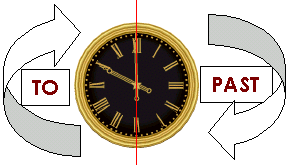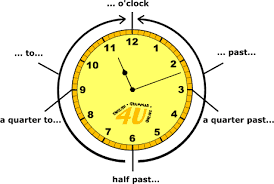Completa los espacios con la forma correcta de los verbos irregulares. Sigue los ejemplos.
INFINITIVE | PAST | PAST PARTICIPLE | ||
| read | read | |||
| ride | ||||
| ring | ||||
| rise | rose | |||
| run | run | |||
| say | said | |||
| see | ||||
| sell | sold | |||
| send | sent | |||
| shoot |
| Time expressions - Expresiones de tiempo. What's the time?  La expresión utilizada en inglés para preguntar la hora es la siguiente: What time is it? o también What's the time? (menos usual) = ¿Qué hora es?Aunque también existen otras posibilidades: - Have you got the time? - Could you tell me the time please? - Would you mind telling me the time? - Have you got the time on you? - You wouldn't know the time, would you? - Do you know the time? |
Se utiliza 'a.m.' y 'p.m.' en un lenguaje más formal y normalmente escrito.
Ej. Banks are open from 9:30 a.m. to 2:30 p.m.
Es más normal decir: 'In the morning', 'In the afternoon', 'In the evening', 'At night'
Ej. Banks are open from 9:30 a.m. to 2:30 p.m.
Es más normal decir: 'In the morning', 'In the afternoon', 'In the evening', 'At night'
7:00 a.m. = seven o'clock in the morning.
2:15 p.m. = quarter past two in the afternoon.
7:30 p.m. = half past seven in the evening
11:00 p.m. = eleven o'clock at night
2:15 p.m. = quarter past two in the afternoon.
7:30 p.m. = half past seven in the evening
11:00 p.m. = eleven o'clock at night
o'clock es una contracción antigua que significa 'of the clock' (del reloj). El empleo actual equivale al español 'en punto' (seven o'clock = siete en punto).
o'clock = 'en punto' a quarter past... = 'y cuarto'
half past... = 'y media' a quarter to... = 'menos cuarto'
half past... = 'y media' a quarter to... = 'menos cuarto'
12:00 = midday
24:00 = midnight
24:00 = midnight
 | Cuando a la hora sigue una fracción de minutos, si es inferior a 30 se utiliza el adverbio 'past'. Si es superior, se indican los minutos seguidos de la preposición 'to'. It's twenty past eleven / son las once y veinte It's ten to four / son las cuatro menos diez |
En los horarios oficiales (por ejemplo los horarios de transportes) se sigue el sistema internacional de división del tiempo en 24 horas.
I left on the 17.30 train from Edinburgh / Salí de Edimburgo en el tren de las 17:30
- Escríbe la hora para cada reloj, siguiendo el ejemplo:  | |
 1. |  2. |
 3. |  4. |
 5. |  6. |
2. It’s five past three.
3. It’s quarter past twelve.
4. It’s four o’clock.
5. It’s twenty past twelve.
6. It’s five to twelve.
What's the date?
- Cambia las siguientes fechas de forma de abreviada a escrita o de escrita a abreviada.
1. the nineteenth of October, two thousand and two.
2. December the twelfth, nineteen ninety-nine.
3. the twenty-first of June, two thousand and five.
4. February the eighth, nineteen seventy-five.
5. the seventh of May, two thousand.
6. 4 Feb. 1998
7. 17 July 2003
8. 29 November 1999
9. 16 March 2000
10. 1 April 2005
2. 12/12/99 – 12 December 1999
3. 21/6/05 – 21 June 2005 (US = 6/21/05)
4. 8/2/75 – 8 February 1975 (US = 2/8/75)
5. 7/5/00 – 7 May 2000 (US = 5/7/00)
6. The fourth of February (February the fourth), nineteen ninety-eight
7. The seventeenth of July (July the seventeenth), two thousand and three
8. The twenty-ninth of November (November the twenty-ninth), nineteen ninety-nine
9. The sixteenth of March (March the sixteenth), two thousand
10. The first of April (April the first), two thousand and five
Expresiones adverbiales
| a long time ago, hace tiempo | all at once, súbitamente |
| as soon as, tan pronto como | at any rate, de todas formas |
| as far as, según | by and large, hablando generalmente |
| by far, con mucho | by the way, a propósito |
| (every) now and then, de vez en cuando | far better, mucho mejor |
| in so far as, en cuanto | in the long run, a fin de cuentas |
| off hand, a primera vista | off hand on, a ratos |
| of late, de poco tiempo a esta parte | on no account, de ninguna manera |
| on purpose, intencionalmente | on the whole, en suma |
| so as to, de manera que | somehow or other, como sea |
| so far, hasta ahora | so long as, mientras |
| sooner or later, tarde o temprano |
ADVERBIOS + PREPOSICIONES (Formas adverbiales idiomáticas)
En inglés hay muchos adverbios que se unen con preposiciones para formar locuciones adverbiales (expresiones formadas por un grupo de palabras que equivalen a un solo adverbio) que, traducidas literalmente, no tienen sentido a veces, pero que necesitamos conocer para comprender su significado. Ejemplo de locuciones adverbiales en español tenemos también muchos (tal vez, mas o menos, de repente, a menudo, por las buenas, a manos llenas, etc.).
Algunos ejemplos de las más significativas en inglés son:
| A little beyond, un poco más lejos | Almost over, casi acabado | |||
| Along with, junto con | All through, de principio a final | |||
| Altogether below, por debajo de | Apart from, por otra parte | |||
| Away from,. lejos de | Close upon, cerca de | |||
| Close beside, junto a | Distinctly above, claramente por encima | |||
| Down to, hasta | Far below, muy por debajo | |||
| Greatly to, grandemente | Hard by, al lado mismo | |||
| Long after, mucho después de | Out of, por, a causa de | |||
| Shortly before, poco antes de | Up to, hasta, al |
- Elige la expresión correcta:
1. He’s the cleverest person I know.
2. buy the computer unless I’m with you.
3. She’ll agree to go out with me .
4. I’ll phone you I get to the hotel.
5. Don’t worry, we’ll get the money .
2. On no account
3. sooner or later
4. as soon as
5. somehow or other





No hay comentarios:
Publicar un comentario